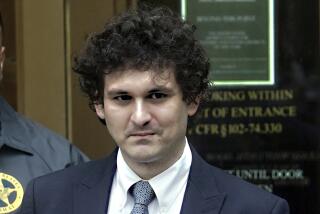Madoff’s lies weren’t scrutinized
WASHINGTON — As federal regulators probed Bernard L. Madoff’s remarkably consistent investment returns, he was able to brush them off, in part, by claiming a magic touch.
“Some people feel the market,” he told Securities and Exchange Commission investigators in 2006, 2 1/2 years before his gigantic Ponzi scheme was discovered. “Some people just understand how to analyze the numbers they’re looking at.”
Unfortunately for investors in Madoff’s fund, some people at the SEC didn’t understand how to analyze his numbers, according to an internal agency review.
Regulators received “more than ample information” that Madoff was defrauding investors but repeatedly fumbled inquiries into his business dealings, allowing the scam to go undetected for 16 years, a summary released Wednesday of the review says.
SEC staff members could have uncovered Madoff’s multibillion-dollar fraud had any of its three examinations or two more-formal investigations of his operation been conducted properly, H. David Kotz, the agency’s inspector general, wrote in the summary.
But from 1992 to last December, when Madoff’s scam collapsed under the weight of bear-market losses, SEC officials consistently mishandled the “detailed and credible complaints” they received and even the evidence they uncovered, the summary says.
Several times, the agency’s “enforcement staff almost immediately caught Madoff in lies and misrepresentations, but failed to follow up on the inconsistencies,” Kotz said.
Had the agency appropriately followed up, it could have “uncovered the Ponzi scheme well before Madoff confessed,” the inspector general wrote.
Instead, examiners invariably took Madoff at his word about his business -- even when he said in May 2006 that his remarkable investment returns “were due to his perfect ‘gut feel’ for when the market would go up or down,” Kotz said.
In 2004 and 2005, two parallel inquiries were conducted with “insufficient planning” by “relatively inexperienced” examination teams in different SEC offices, the report summary says.
“Astoundingly, both examinations were open at the same time in different offices without either knowing the other was conducting an identical examination,” Kotz wrote. Madoff was the person who broke the news to them.
Madoff is serving a 150-year prison sentence after pleading guilty in March to 11 counts of fraud. Prosecutors said Madoff had cost his investors at least $13 billion and possibly as much as $65 billion.
“The inspector general’s report lays out the string of massive regulatory failures and incompetent investigations at the SEC that led to unimaginable loss for so many,” said Senate Banking Committee Chairman Christopher J. Dodd (D-Conn.), who plans a hearing next week on the report.
Although Kotz found that the SEC had incompetently handled the Madoff case, he said he did not find evidence of impropriety by anyone at the agency.
Still, the summary of a 450-page report due out any day was a stinging indictment of the agency charged with being Wall Street’s watchdog.
“His report makes clear that the agency missed numerous opportunities to discover the fraud,” said SEC Chairwoman Mary Schapiro, who took over this year amid calls for major reform. “It is a failure that we continue to regret, and one that has led us to reform in many ways how we regulate markets and protect investors.”
Schapiro touted changes she has made since January to prevent a repeat of the Madoff mess, including increased internal training, revamping how tips are handled and recruiting examiners with more expertise. Among her first major appointments was Robert Khuzami, a former federal prosecutor who headed a securities and commodities law task force, as head of the SEC’s enforcement division.
The biggest change under Schapiro has been a new emphasis on enforcement after eight years of leadership during the Bush administration that did not make it a priority, said Lynn Turner, a former SEC chief accountant.
“I think it will make a difference,” Turner said. “Will it fix the problems? I don’t think we’ll know the answer to that question until we see what comes out of the agency for the next couple of years.”
--
More to Read
Inside the business of entertainment
The Wide Shot brings you news, analysis and insights on everything from streaming wars to production — and what it all means for the future.
You may occasionally receive promotional content from the Los Angeles Times.











